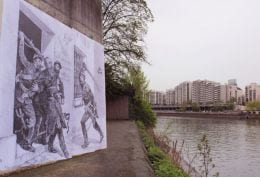7th Dec 2013 9:00am-5:30pm
Grand Parade
In this year’s symposium, we intend to explore new approaches to the experiences of war and conflict as they are negotiated, remembered, mediated and lived. The focus of the symposium is not only to chart new lines for both theoretical and empirical analysis of the way in which violent conflicts are (and were) apprehended and articulated, but also the ways violent legacies shape and haunt processes of post-conflict transition.
In addition to the keynote speaker Dr. Santanu Das, who will argue for a more emotional and somatic history of the First World War through the discussion of the experience, often ignored, of the Indians that participated in the conflict, the symposium is divided into three panels. The first focuses on the notion of conflict and violence as it is performed and experienced, but also perceived through bodily frames (negotiated in terms of presence or absence) in cultural representation. It discusses the affective realm of warfare – the relevance of pain, pity and grief for the new current paradigms in cultural history. The second panel maps out the entanglements between the politics of the past and the politics of reconciliation in cultures and societies undergoing violent conflict or dealing with ‘post-conflict’ legacies. It deals with the tension between competing narratives, the effects of binary oppositions, and the ambiguous nature of many of the elements that shape post-conflict scenarios. The last panel examines the geographies of memory as a key element of the understanding of war and conflict. Space here will not only be seen as a material container of violent marks of the past or as the main arena for the struggles over memorialisation, but also as an intrinsic dimension of the practice of remembering.
Bringing together scholars with different yet overlapping backgrounds and research expertises, the symposium will reflect upon some of the issues at play in the ever-growing field of peace and conflict studies. Ranging from ethnographic and sociological approaches to more historical-based research, the speakers will deal with singular expressions of both contemporary and historical violence as it is articulated in a range of contrasting spatio-temporal contexts (Bosnia, Northern Ireland, Norway, Indonesia, Kenya, Afghanistan and England among them), thus tracing and offering solutions to common methodological and conceptual challenges from a transnational perspective.
Speakers include: Santanu Das (King’s College London); Emilie Pine (University College Dublin); Gabriel Koureas (Birkbeck, University of London); Kevin McSorley (University of Portsmouth); Mark McGovern (Edge Hill University); Lotte Hughes (The Open University); Stefanie Kappler (Liverpool Hope University); Safet HadžiMuhamedović (Goldsmiths, University of London), Sam Edwards (Manchester Metropolitan University) and Charlotte-Heath-Kelly (Warwick University).
Podcasts from this event are available to download here.


Leave a Reply